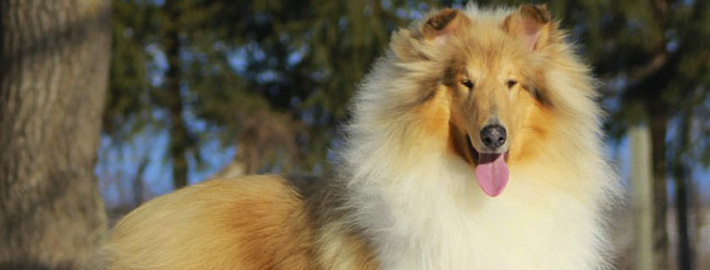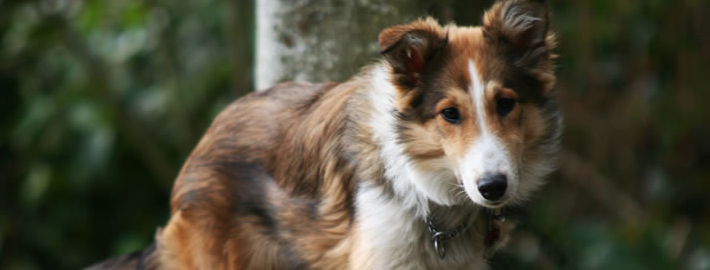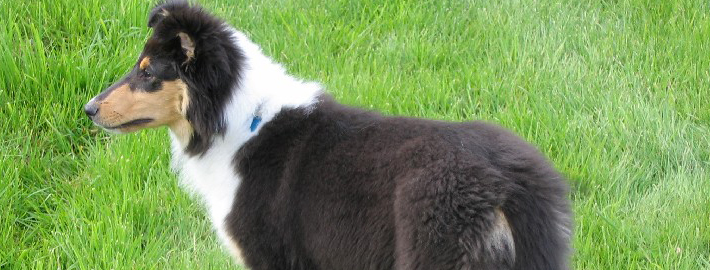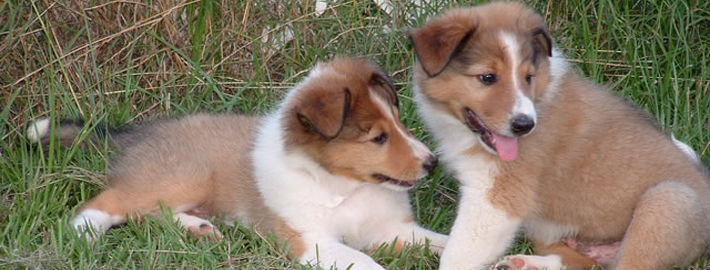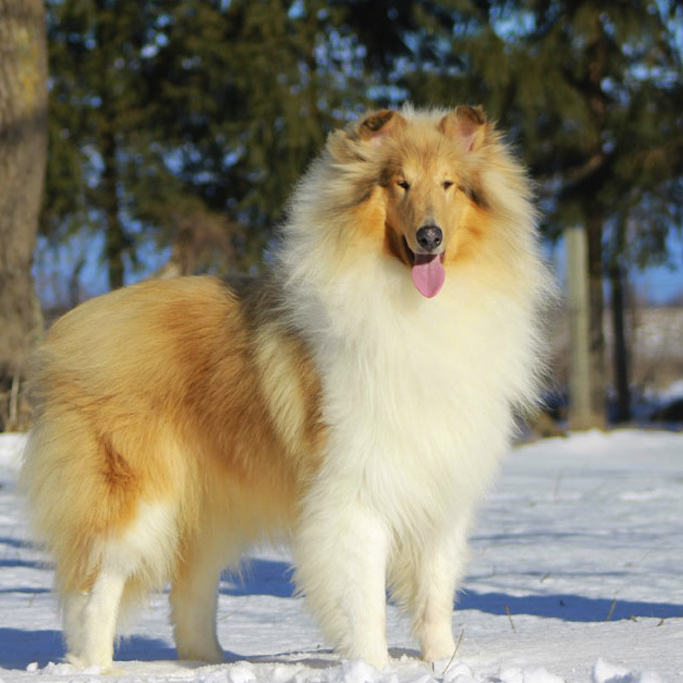What makes the Scotch Collie Unique?
Scottish Collies started off their history as multi purpose farm dogs. Iris Combe even went so far as to claim in her book, Herding Dogs, Their Origins and Development in Britain, that the word ‘collie’ is derived from the Gaelic word for useful but there seems to be scant evidence to support her claims. However, Scottish Collies are indeed useful creatures. As working animals, these canines are most commonly seen managing herds of sheep. These dogs can also be used for hunting and, in fact, one line of Collies is starting to be developed specifically for catching squirrels. Many other members of this breed have found their calling as family pets. Other jobs for Scotch Collies include guarding property, pulling carts, and helping handicapped persons.
Breed Groups
Page Contents
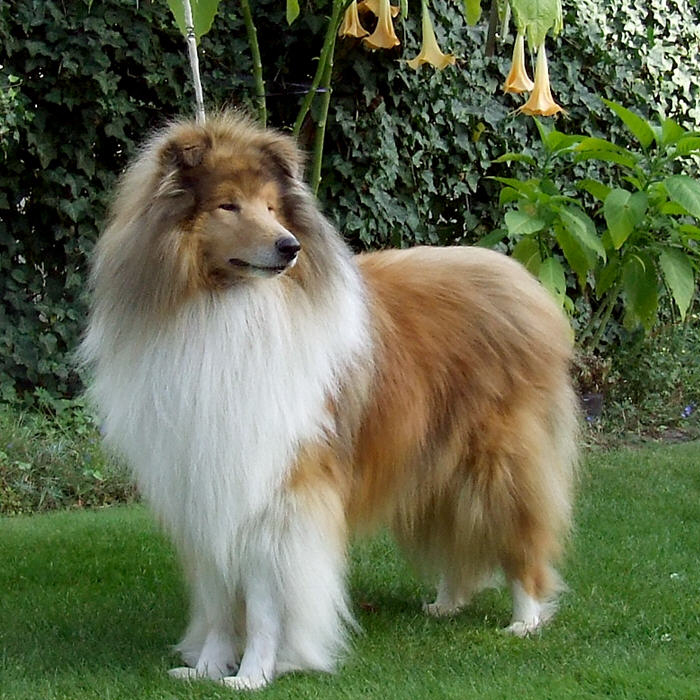
SnapShot
| Size: | Males – 53 to 61 cm (21 to 24 inches) Females – 48 to 56 cm (19 to 22 inches) |
| Weight: | Males – 21 to 32 kg (45 to 70 pounds) Females – 18 to 27 kg (40 to 60 pounds) |
| Origin: | Northern England and Scotchland |
| Life Span: | 12 – 16 Years |
| Colour: | Sable and white, tri-color, blue merle, white and tan |
| Litter Size: | up to 10 puppies |
Is the Scotch Collie Right For You?
Scottish Collies are incredibly personable dogs. These intelligent animals have exceptionally kind personalities but that does not keep them from being a protective breed. They are highly trainable and eager to please. Although a few members of this breed may stick like glue to their favorite people, this trait is not usually viewed as a problematic one. In fact, most Scotch Collies are quite friendly towards people that they know. Members of this breed typically get along well with other dogs as well as other pets in their households. These playful dogs also make good playmates for children.
In 5 Words
- Loving
- Affectionate
- Protective
- Active
- Intelligent
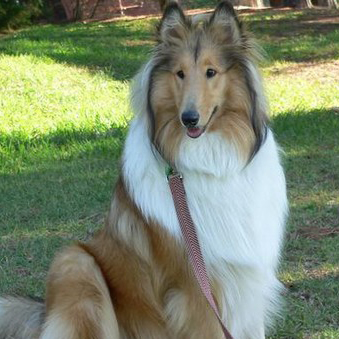
Characteristics
Learn About the Scotch Collie
Description
General Description
Scottish Collies are medium to large sized dogs that are widely considered quite beautiful. Members of this breed are thin individuals that possess an athletic appearance and walk with an elegant gait. These dogs have proportionate heads, shapely muzzles, and black noses. Scottish Collies also have blue or brown eyes that are almond shaped and are of an average size. These dogs are said to have a mournful expression. They additionally possess small, high set ears that are held upright when the individual in question is paying attention to something and are laid back on their heads when the dog is relaxed. Members of this breed possess average sized tails that curl up slightly when the dog’s attention is engaged.
Size
Female dogs of this breed typically stand between 19 and 22 inches (48 and 56 centimeters) in height and they generally weigh anywhere from 40 to 60 pounds (18 to 27 kilograms) on average. Male dogs are comparatively larger with 45 to 70 pounds (21 to 32 kilograms) being their average weight. They also stand somewhat taller than their female contemporaries at around 21 to 24 inches (53 to 61 centimeters) in height.
Coat
These dogs come in long and shorthaired varieties that are respectively known as rough and smooth coated collies, which together make up the breed. After all, dogs with either length fur can come from the same litter. Scotch Collies with longer fur have a lush double coat that is thicker around their necks than it is on other parts of their bodies. Shorter furred individuals will have a sleeker texture to their coats. These dogs come in black and white, with or without tan as third color. Merle dogs may also be seen from time to time.
Short History of the Scotch Collie
Scotch Collies originated precisely where their name indicates. These animals were popular both in their homeland and in the neighboring kingdom of England for many centuries. These dogs are generally thought to be among the ancestors of numerous breeds including the Border Collies, Kelpies, and similar types of dog. The breed reached the attention of the general public when several were adopted by Queen Victoria during the 1860s. The dogs quickly gained a deserved reputation as devoted family companions and remained popular for quite some time after that. Noteworthy examples of this breed include ‘Lassie’ from the television show of the same name and ‘Lad’ from the stories by Albert Terhune.
Temperament
Scottish Collies are incredibly personable dogs. These intelligent animals have exceptionally kind personalities but that does not keep them from being a protective breed. They are highly trainable and eager to please. Although a few members of this breed may stick like glue to their favorite people, this trait is not usually viewed as a problematic one. In fact, most Scotch Collies are quite friendly towards people that they know. Members of this breed typically get along well with other dogs as well as other pets in their households. These playful dogs also make good playmates for children. However, some may attempt to herd youngsters so prospective owner should definitely be aware of that tendency. How well an individual Scotch Collie gets along with strangers depends on the dog itself. Some are very friendly towards unfamiliar people while others might be more reserved in their demeanor.
Caring for Your Scotch Collie
General Health
With an average lifespan of 12 to 16 years, members of this breed are generally very healthy dogs. However, problem can arise from time to time. Collie breeds in general, including the Scotch Collies, tend to have problems with a number of common medications because a mutation of the MDR1 gene is present in many individuals. The Veterinary Genetics Laboratory discovered that this particular problem dates back to a British dog from the 19th century and the trait naturally continues in its’ descendants. In fact, a large percentage of modern animals show signs of this mutation. This means that over 20 different medications, including the Ivermectin that is commonly found in various heartworm prevention products, could cause serious side effects and might even be toxic to the animal in question.
Care
Daily
A daily walk is highly recommended for members of this breed. Scotch Collies need plenty of regular exercise but access to a fenced in yard won’t take care of all their exercise requirements. Jogging with their human owners and playing fetch are other good pastimes for these dogs.
Weekly
It is always a good idea to brush your pet’s teeth several times per week, if not every day.
Monthly
Parasite prevention medications should be administered on a regular basis. Most products need to be given once a month for maximum effect. However, Scotch Collie owners will want to have their pets tested for the MDR1 gene before attempting to treat them for pests so that that they can medicate their dogs accordingly.
Grooming & Bathing
Scotch Collies with shorter hair naturally require less grooming than their fluffier counterparts. Long haired individuals should be thoroughly brushed at least once a week, if not more often, in order to prevent tangles and mats from forming. These dogs also go through periods of heavy shedding and should be brushed on a daily basis at such times to keep their households from becoming inundated with fur.
Exercise & Training
Scotch Collies are not as hyperactive as Border Collies. However, members of this breed are by not lazy by any stretch of the imagination. They need daily workout sessions, adequate mental stimulation, and regularly human interaction in order to be at their best. As long as they have all these things, Scotch Collies are happy to watch the house when their owners are not at home. Consistent rules and a loving hand are also essential when training members of this intelligent breed.

